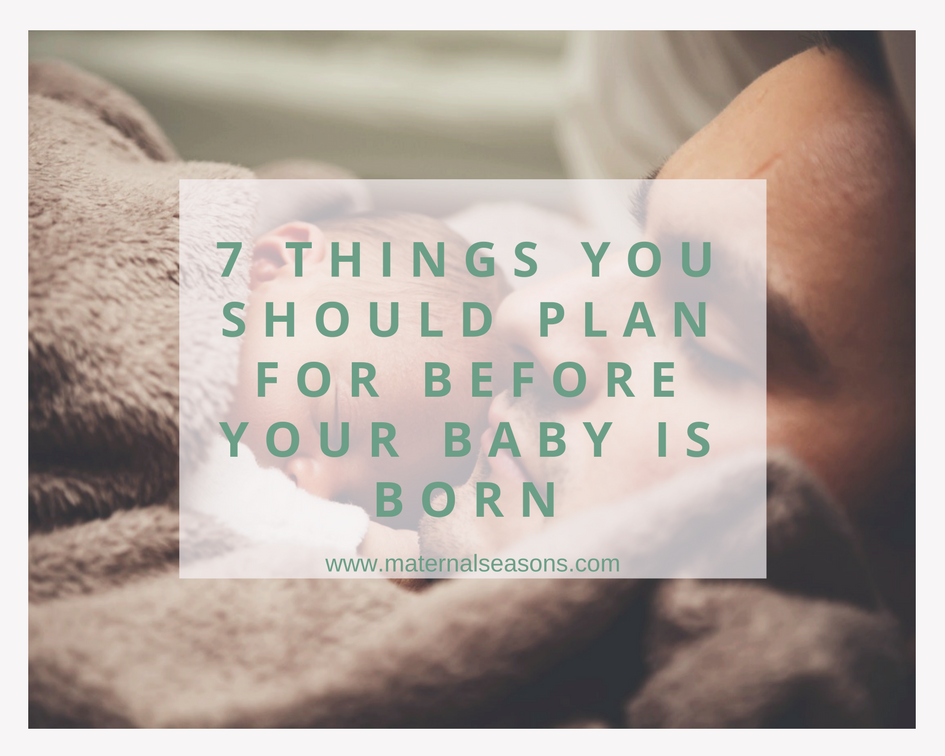|
Birth plans have become increasingly more popular in the U.S., as people are taking more ownership in their health care. However, our culture is majorly slacking when it comes to planning for the postpartum period, or the “fourth trimester,” as some call it. Did you know that the “postpartum period” extends beyond the first 6 weeks? The word postpartum means “following childbirth.” So, the postpartum period is anytime after you’ve had a baby! For the purposes of this blog post, I’ll be talking mainly about the “fourth trimester,” or first 3-4 months following childbirth. So, why do you need a Postpartum Plan?Well, let’s compare birth and postpartum to wedding and marriage. Many people spend a LOT of time (and money!) planning and preparing for their wedding day. And, don’t get me wrong, it’s a very important, special day that you’ll remember for a long time. It’s an extremely pivotal day. One that marks the beginning of a new chapter in your life. But then… after the wedding day comes the actual MARRIAGE part, which can be surprisingly harder than you expected!
This is often the same case when it comes to birth and postpartum. People spend a lot of time planning and preparing for the birth of their baby: reading books about pregnancy and childbirth, taking a childbirth class, going to doctor’s appointments. You might hire a birth doula to make sure you have emotional and physical support during the tough parts of labor. You may create a birth plan which lays out the details of how you hope the birth will go. It’s great to plan for your birth and have ownership in how this event will go. Birth changes you. The story of how each of your children was born will affect you for the rest of your life, in ways you can’t even imagine. But then… after birth comes the actual PARENTING part, which may be surprisingly harder than you ever expected! Now, just like marriage, there are wonderful parts of parenting. But there are seasons of parenting that are very challenging. The first 3-4 months after having a baby can be exhausting, scary, lonely, draining, and overwhelming. I don’t say this to scare you. I say this so that maybe you’ll be less shocked if this ends up being your experience. The good news is that there are things you can do ahead of time to make it less exhausting, scary, lonely, draining, and overwhelming! What kinds of things can you do ahead of time to prepare for the postpartum period? Just like a birth plan, your postpartum plan will be unique to you… Your past experiences, your values, your health history, your life situation, your preferences. But here are some things I recommend you plan for: 1. Your physical recovery. Because having a baby is a BIG DEAL. Though it’s a very normal process, birth is considered to be very traumatic for a woman’s body. There’s a reason you bleed for several weeks: you have a gaping wound inside your uterus from where that amazing organ that your body created (the placenta) nourished the PERSON you grew and birthed! I cannot emphasize enough how important respecting your recovery period is. 2. Feeding your baby. This is also a big deal. Now that this little person is outside of your body, you have to figure out how to keep them alive. (No pressure!) Many people intend to keep their babies alive with human milk. And though breastfeeding is a normal process, it is also very complex. In our culture, we don’t usually witness this process throughout our lives, so it’s not always intuitive. There are many things that can potentially affect lactation. Some people plan to keep their babies alive with formula, which you may not realize is more complicated than just dumping powder and water into a bottle. You must learn to prepare it properly and safely ahead of time. 3. Caring for a newborn. Most adults have a basic idea of how to care for a newborn: feed them, change their diaper, let them sleep. But, if you’ve never cared for a newborn, there are probably a lot of things that you don’t even know you don’t know! What “gadgets” do you actually need? How do you know when your baby is hungry, tired, or wet? Why won’t the baby stop crying?!? What is the point of swaddling, and how do you do it? How do you make sure your baby’s sleeping area is safe? How do you burp a baby? Is it even necessary to burp a baby? How do you know if your car seat is properly installed and if you know how to use it properly? Why do some people “wear” their babies? And how do you know which of the 942 types of infant carriers to use? Some of these things you figure out as you go, but many can be learned about and practiced ahead of time. 4. Practical support. Caring for a baby is TIME-CONSUMING. Sometimes it seems as if they are constantly eating, pooping, peeing, and crying. It is CRUCIAL to have help lined up for the first couple weeks, at a minimum. The first 6-12 weeks is ideal, but not always possible. What you need to know is that it is impossible to maintain your pre-baby life during the first few weeks and months. This fourth trimester is a unique phase of life and should be treated as such. A woman who has had a baby should be cared for and allowed to rest, heal, and get to know her baby without having to worry about doing ALL the things. A professional Postpartum Doula is an amazing resource, but if this is not an option, think of family or friends who could help. Whether it’s bringing a meal, doing some dishes or laundry for you, or holding a baby so you can nap, don’t be afraid to ask someone to help! 5. Self-care. This has become a buzzword lately, but it actually is important. You know, the whole, “You have to put your own oxygen mask on before you can put another person’s on” thing? It’s the TRUTH! But the thing you may not know is what YOUR particular “oxygen mask” is. What is the thing that makes you feel re-energized? Or relaxed? And what do you need to do to protect your emotional and mental health? 6. Sleep. This is HUGE. So much important stuff happens in your brain and body when you’re sleeping. Sleep deprivation doesn’t affect each person to the same degree, but it is harmful to your body and can lead to things like mood swings, difficulty concentrating, weight gain, depression, anxiety, insomnia, increased risk of car accidents, and, rarely, even psychotic episodes. But, as you probably know, newborn babies don’t tend to sleep long stretches at a time! This is normal and to be expected. BUT that doesn’t mean you have to be completely sleep deprived. There are different strategies that can help parents of a newborn to get enough sleep to function and prevent exhaustion. 7. Emotional and mental health. Did you know that approximately 15% of women experience depression, anxiety, or other mental health issues after having a baby? That’s about 1 in 7! It can happen to anyone, regardless of race, socioeconomic status, or history. But there are certain factors that may put you at a higher risk. The good news is that you can potentially prevent it, or at least recognize it early and treat it before it worsens. Every person expecting a baby should learn the signs and symptoms of Depression, Anxiety, OCD, PTSD, and Psychosis. This and other information about Maternal Mental Health can potentially save relationships and save lives. So. Those are 7 things you should think about and plan for when you’re expecting a baby. Don’t forget about that fourth trimester! Your baby will need you to be at your best, and you’ll be so thankful you planned ahead. If you have specific questions about planning for the postpartum period, feel free to reach out to me at [email protected] or message me on Facebook!
0 Comments
|
AuthorWrite something about yourself. No need to be fancy, just an overview. Archives
January 2018
Categories |


 RSS Feed
RSS Feed
